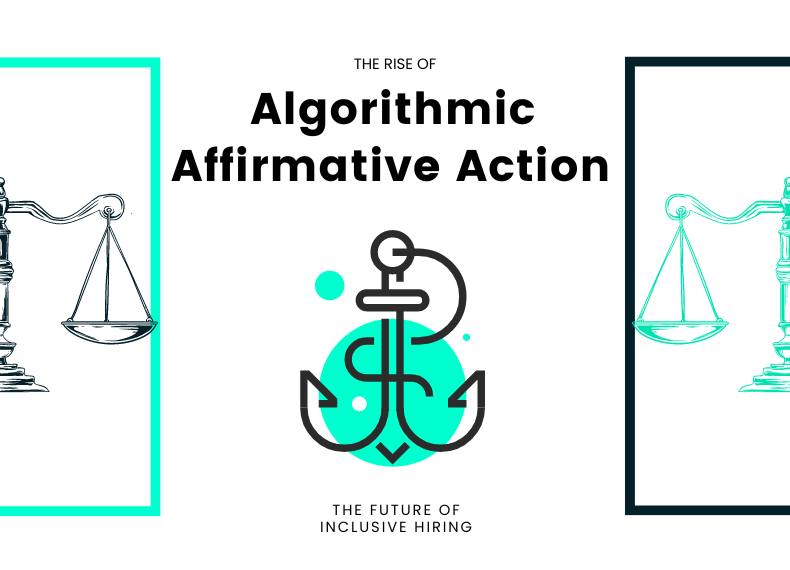
In the evolving landscape of Diversity, Equity, and Inclusion (DEI), "algorithmic affirmative action" emerges as a groundbreaking approach, leveraging advanced algorithms to promote fairness in hiring and talent retention. This method extends beyond traditional affirmative action by integrating technology to systematically identify and mitigate biases, ensuring a diverse and inclusive workplace.
What is Algorithmic Affirmative Action?
Algorithmic affirmative action uses data analytics and AI-driven tools to analyze recruitment, hiring processes, and retention rates, aiming to offer equal opportunities for underrepresented groups. Companies can foster a more equitable selection process by adjusting algorithms to counteract unconscious biases.
Pros of Algorithmic Affirmative Action
Data-Driven Decisions: Enhances objectivity in hiring by relying on empirical data rather than subjective judgment.
Bias Mitigation: Identifies and corrects biases in recruitment algorithms, promoting diversity in the workplace.
Scalability: Can be applied across various stages of the employment lifecycle, from hiring to promotion, ensuring consistent DEI practices.
Legal Compliance: Helps organizations meet affirmative action requirements while adapting to local regulations, particularly relevant in the diverse legal landscapes of Southeast Asia (SEA).
Cons of Algorithmic Affirmative Action
Algorithmic Bias:
Risk of perpetuating existing biases if not carefully monitored and updated.
Solutions to Algorithmic Bias
- Regular Algorithm Audits: Implement periodic reviews of AI systems to ensure they operate without bias. Google, for instance, conducts regular equity assessments of its AI and machine learning products to identify and mitigate biases.
- Diverse Training Data: Ensure the data used to train algorithms includes diverse demographic backgrounds. IBM's Diversity in Faces project aims to create more varied datasets to reduce facial recognition biases, a principle that can be extended to hiring algorithms.
Complexity in Implementation:
Requires significant expertise and resources to develop, implement, and maintain effective systems.
Overcoming Complexity in Implementation
- Partnerships with AI Ethics Experts: Collaborate with third-party experts specializing in AI ethics to guide the development and implementation of algorithms. Salesforce works with an Office of Ethical and Humane Use of Technology to navigate these complexities.
- Use of Pre-Developed AI Solutions: Small and medium enterprises (SMEs) can leverage AI tools from established providers like LinkedIn Talent Solutions, which offers AI-driven tools to help identify a diverse range of candidates without the need for extensive internal resources.
Data Privacy Concerns:
Collecting and analyzing sensitive demographic data necessitate robust data protection measures.
Addressing Data Privacy Concerns
- Strong Data Governance Frameworks: Implement strict data governance policies to manage how data is collected, stored, and used, ensuring compliance with global data protection laws like GDPR. Accenture’s comprehensive data governance framework serves as a model, emphasizing transparency and accountability.
- Anonymization of Data: Use anonymized datasets during the algorithm training phase to protect individual privacy. Deloitte's AI ethics principles advocate anonymizing personal data to mitigate privacy risks. We at KarmaV however do not advocate for any anonymization of data, as in the current world environment, systems are intelligent enough to deduce the standard characteristics with the available information.
Addressing the challenges associated with algorithmic affirmative action in hiring and talent retention requires strategic planning, ethical considerations, and technological sophistication. Here are recommendations to overcome the cons.
Recommendations
- Continual Learning and Improvement: Ensure that AI systems are audited regularly and updated based on the latest research and diversity, equity, and inclusion best practices.
- Transparency with Candidates and Employees: Be open about the use of AI in hiring processes, including how algorithms are used and measures taken to ensure fairness.
- Diverse Development Teams: Include individuals from various demographic backgrounds in developing and implementing AI tools to bring diverse perspectives to the table, which can help identify potential biases more effectively.
- Ethical AI Frameworks: Develop and adhere to an ethical AI framework that outlines the use, limitations, and ethical considerations of AI in hiring, guided by international standards and best practices. KarmaV's Intelligent Recruitment Solution that measures candidate fitment matches the talent with the role while mitigating unconscious bias.
- Stakeholder Engagement: Involve a wide range of stakeholders, including job candidates, employees, and diversity advocates, in the development and evaluation of AI tools to ensure they meet the needs of all users.
By addressing these challenges through strategic, ethical, and technological solutions, organizations can leverage algorithmic affirmative action to enhance diversity and inclusion in the workplace. The key lies in a balanced approach that respects individual privacy, ensures fairness, and embraces continuous improvement, setting a standard for responsible AI use in hiring and talent retention.

0 Comments
No Comments Found.